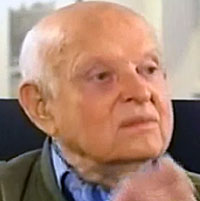Reflections on a Classic (and Rare) Interview with Henri Cartier-Bresson on PBS
posted Thursday, June 21, 2012 at 10:25 AM EDT
 For some reason, this old Charlie Rose PBS interview with photographer Henri Cartier-Bresson (view it in its entirety below) has resurfaced and is making the rounds on social media this week. This is great because young photographers who have only heard about HCB will get a chance to see him “live.” If they can get passed Rose’s rather annoying, cloying manner, they will discover that Cartier-Bresson has a lot to say about our lives and photography.
For some reason, this old Charlie Rose PBS interview with photographer Henri Cartier-Bresson (view it in its entirety below) has resurfaced and is making the rounds on social media this week. This is great because young photographers who have only heard about HCB will get a chance to see him “live.” If they can get passed Rose’s rather annoying, cloying manner, they will discover that Cartier-Bresson has a lot to say about our lives and photography.
Considered one of the greatest photographers of the century, at the beginning of this video, photographer Richard Avedon goes so far as to say that Cartier-Bresson was, “One of the five greatest artists of the century.”
However, Cartier-Bresson had little interest in accolades. In response to Rose's high praise, he replies that he is a simple “anarchist.” Although he hardly meant this as a political statement, Rose smells blood and comes back to this word often.
Rose has been criticized for this interview; but, I think in the end, he is a perfect foil for HCB. The old man, with a lifetime of experience and achievement confronts Rose, an interviewer of little worldliness. Rose is asking the questions he thinks his audience wants to have answered and is full of attitude, his tone at times belligerent.
He speaks loudly, as though HCB doesn’t understand English, despite having lived and traveled in America and being fluent. Ultimately, Cartier-Bresson understands Rose better than Rose understands him. Rose goes off track at times, asking Cartier-Bresson about things like globalization and such. HCB sits and listens patiently, his calm manner telling us that he knows that the younger man just does not get it.
As a photographer, strongly influenced by Cartier-Bresson, I like the interview. I have seen it before and when HCB says he is an anarchist, I know that he saying that he is someone who has lived outside the usual world of middle class, bourgeois society. He is more a “Bohemian” than a bomb thrower.
The photographs of Cartier-Bresson are true to Cartier-Bresson, they are a mirror of the man. Born into a wealthy family (Cartier-Bresson Textiles), he grew up surrounded by money and art. It gave him a sense of personal worth, even security that served him well through his travels.
It gave him the courage to escape several times from German prison camps during the Second World War. This upbringing allowed him to turn a wry eye on the powerful and famous as well as a compassionate one towards the lowliest of people, like the Mexican prostitutes (1930s.)
Rose wants to know specifics of techniques. Like so many people, he wants there to be a knowable secret method or a magic amulet or a charm that will explain how someone could create such work. This results in awkward questions such as, did HCB always use a “50mm camera” and “why don’t you print your own pictures.”
It is as though an answer would make a difference, would make it possible for Rose to make the same pictures. There is a lot of this in photography, the quest for the magic lens or perfect camera, or the trick that will make one a great photographer.
HCB understands the thrust of Rose’s questions, and keeps turning them back on him, speaking to the heart of things. Rose, lost in his world of “hows” and “whys” refuses to hear the answers and does not believe Cartier-Bresson when he says that he just happened to use a camera. Rose is put off, he wants more than to be told that cameras and prints are beside the point.
Worse yet, Rose refuses to hear HCB when he does tell him the "secret" of his photography. It seems too simple for the great man to say that we should see the world deeply, experience it fully, and if we happen to have a camera with us, take a picture.